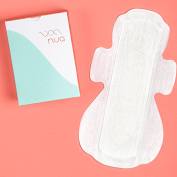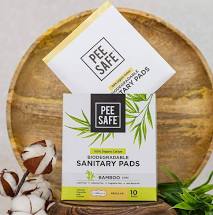Woman hygiene is a crucial part for women, in their reproductive years spanning 30-40 years. Women face several challenges managing menstrual health that impacts their physical as well as psychological state. Sadly, significant percentages of women in India are still using inorganic sanitary pads and do not appear to be in the position to possess access to the foremost feminine hygiene products. With compromise in the quality of these products, they not only get exposed to the threats of infection, but the discomfort also affects their everyday regime. Generally, sanitary pads are prepared using chlorine compounds that contain dioxin, which links to a grown risk of endometriosis, decreased pregnancy, cervical cancer, and UTI.

Widely, females in rural regions are ignorant of menstrual sanitation. It is a struggle to provide women with the right products that protect health as well as ensure characteristics of eco-friendliness. Various brands now, provide ladies with the products they deserve throughout those days.
In a time like ours, with people becoming more and more forward-thinking and no paucity of resources, it has become a matter of high importance to educate women of the availability of organic sanitary products. The interesting part is that these pads biodegrade entirely in 6 months to 24 months. These are plastic, chemical, and dioxin-free and are made exclusively from organic cotton, corn starch, and bamboo as raw material, ensuring that the ideal pH-level is maintained. Organic sanitary napkins are natural and healthy and render women rash and irritation-free days. Natural compounds used as raw material for the manufacturing of these products, have provided the world a solution in terms of environment friendly and easily decomposable alternative.

Nowadays, various brands such as Nua, Azah, Pee safe, The Woman’s Company are broadly accessible online/home delivered and are available in 3 sizes- XL (Heavy Flow), L (Medium), and R (Light). At present, these cost a bit more, in comparison to the regular sanitary products (a pack of 10 organic pads costs approximately Rs. 300). Various brands of organic sanitary napkins are giving their customers options to customize their packs according to their needs.

The arrival of these bio-degradable sanitary pads has brought a fresh start. Most sanitary napkin users are still unaware of such options available in the market and feel hesitant towards something new. For more extensive engagement of Indian society, a widespread awareness, literacy regarding menstrual hygiene, comfortable options and availability of products is a must. Despite the early hick-ups regarding the expenses, the organic sanitary products are likely to bring a revolution in the lives of women.
Aashi is a working PR professional who enjoys a good amount of her free time reading, cooking, and taking care of her 2 dogs.